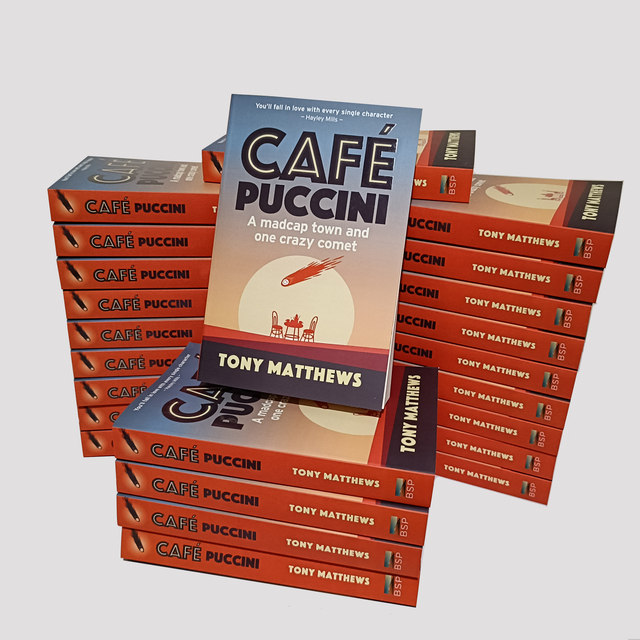Set in 1959, Café Puccini by Wide Bay author Tony Matthews is a lighthearted and humorous pastiche of events surrounding the lives and adventures of numerous colourful personalities who live in a small Queensland country town called Wellsprings, situated on the banks of a wide, slow-moving river.
Internationally acclaimed Academy Award winning actress, Hayley Mills has touched her magic-wand to a new book by an Australian novelist, stating: “You’ll fall in love with every single character“.
This latest book by the reclusive Welsh-Australian utilises many true and astonishing stories which the author researched during his years as one of Australia’s most experienced authors and historians.
When Cactus Bob, who had once miraculously survived a crocodile death-roll, begins receiving colour-coded messages on his ‘factory-reject’, 1950s, black-and-white television, he has to decide if they have somehow been placed there by the wily old Chinese trader who had sold him the clapped-out TV, or if they really are super-urgent warnings from outer-space.
What happens next is a hilariously heart-pounding story.
‘“I wanted to make this a non-violent, feel-good story so it was important for me to be able to create characters to whom readers could relate,“ Tony said.
“There are characters from a wide range of backgrounds including an irascible café proprietor who has managed somehow to mislay his wife for 13 years; a former circus strongman from Turkey who is 99 years of age and who actually eats dynamite; a wealthy businessman whose great-grandfather, a Zulu warrior, had fought the British Redcoats at Rorke’s Drift; a Scottish boat-builder named Jimmy who is constructing a ‘monument to the stars’; a beautiful blond woman who had worked for the Norwegian Resistance during the Second World War, and even a Mombasa belly-dancer who is also a white witch.“
Tony’s inspiration for Café Puccini came from a series of interviews he recorded many years ago while writing and directing a television documentary film titled: Images and Reflections which was about Italian migrants to Australia.
“I recorded a large number of in-depth interviews with people who had migrated here, many of whom had come during the late 1940s or through the 1950s, and they spoke about all the difficulties they had experienced and the strangeness of arriving in a country that had been at war with their own homeland only a few years previously,“ Tony said.
“Some, in fact, had been interned as enemy aliens despite the fact that they had lived and worked in Australia for years. It was particularly difficult for them at that time, and I realised that overcoming those hardships had given these people a unique character that could be both tragic and at other times hilariously entertaining.
“During my research for the documentary I interviewed several people who were forced to leave their families behind for years. A dozen years or more of separation was not unusual and it was tragic because during that period people often changed. Even their lives and personalities could change completely.
I wanted to use this kind of dramatic background in my novel to examine how these changes might affect those who had come here and also those who had been left behind. That entire scenario is played out in two of the lead characters of the book: Angelo Silvestri, the proprietor of Café Puccini, and his wife, Bianka. When Bianka arrives in Australia after a separation of thirteen years, her personal situation has changed so much it seems that any kind of reconciliation between herself and Angelo is impossible. This drama lies at the heart of the book but is just one of a wildly kaleidoscopic array of events which go into the construction of the story as a whole.“
The story is set in a fictitious township called Wellsprings which Tony based on the small township on the South Burnett named Wondai, a town he knows very well, having written the history of the Wondai Shire many years ago.
Though not planned Tony ended up writing the first draft of the novel, amounting to around 140,000 words, entirely by hand, mostly in the evenings after spending his working day writing a non-fiction book, Softly softly: capturing Hitler’s spies.
“I was spending so much time at my computer writing the other book during the day, I found it more convenient and relaxing to scribble out a very rough draft of the novel by hand at night,“ he said.
“Sometimes I was enjoying myself so much that I found it difficult to stop and I went through countless biros and notepads until I finally scribbled those last six words which I hope will make a lot of people laugh as they finish reading the book.“
Café Puccini is a captivating journey into the heart of country Australia and creates a kind of time-capsule of a period when life was fun, simple and full of charm.
Tony has written almost 40 books. Arriving in Australia from the UK in the early 1970s, he hitch-hiked across the country with just $24 in his pocket and with little real understanding of the immensity of the continent. The rest, as they say, is history.
Café Puccini has been published by Big Sky Publishing and is available from book-stores and online retailers.










